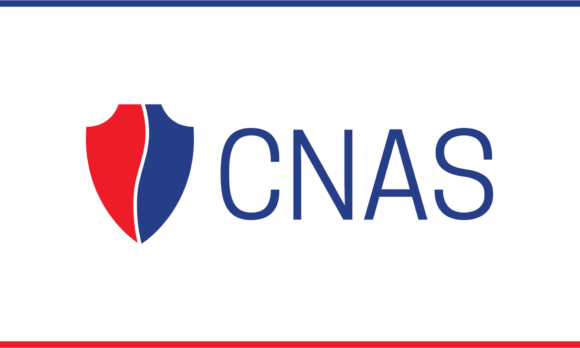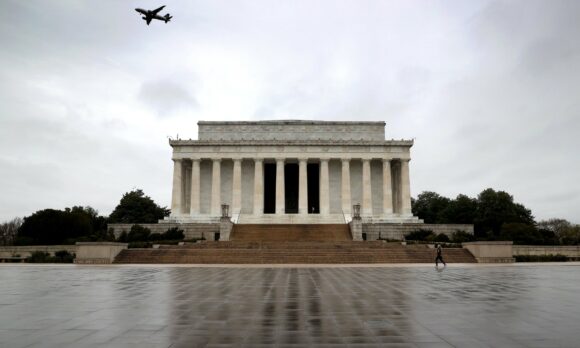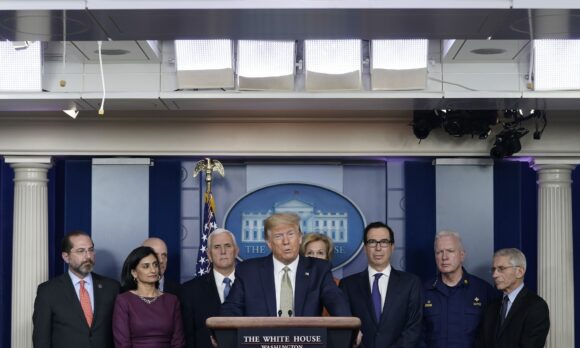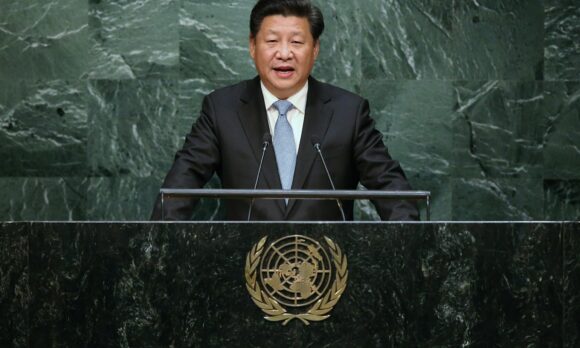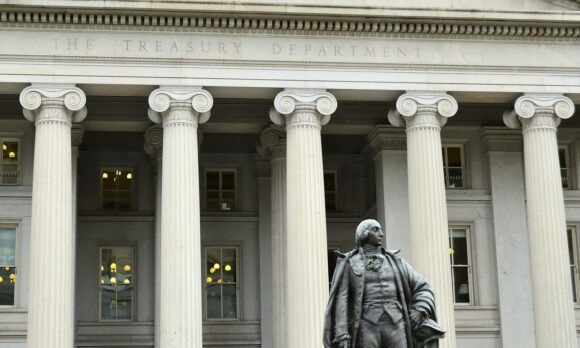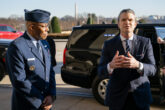July 30, 2020
Sharper: Global Coronavirus Response
Analysis from CNAS experts on the most critical challenges in U.S. foreign policy.
As regions across the United States enforce states of emergency and a growing list of countries restrict travel, close schools, and quarantine citizens, the economic and human costs of the coronavirus (COVID-19) outbreak continue to mount. With no clear end in sight to the crisis, America's national security and public health institutions face a daunting challenge.
CNAS experts sharpen the focus on America's coronavirus response. Continue reading the first edition of the Sharper series to explore their analysis regarding how the United States can improve local resilience, advocate for improvements in the global public health infrastructure, and best utilize every tool at its disposal to respond to the outbreak.
Editorials
Experts from across the Center have offered timely analysis on the U.S. response to the global spread of the coronavirus.
- CNAS CEO Richard Fontaine warned in The Atlantic, "So far, Beijing has squandered the opportunity in dramatic fashion."
- In an article for Foreign Policy, experts Martijn Rasser and Kristine Lee observed that "China is now using the Health Silk Road and its mask diplomacy playbook to increase its leverage over developing countries in the throes of the pandemic."
China Has Squandered Its First Great Opportunity
America has been lucky that Beijing hasn’t acted with more deftness this time around....
China’s Health Silk Road Is a Dead-End Street
With little fanfare, the National People’s Congress—the annual convening of China’s top legislature and the country’s premier political event—rubber-stamped a $1.4 trillion in...
- CNAS CEO Richard Fontaine argued in The Atlantic that "we need an Atlantic Charter for the pandemic. And as FDR and Churchill demonstrated, the time to think and plan is not at the end of a crisis, but as it unfolds."
- Kristine Lee, an Associate Fellow with the Asia-Pacific Security Program, warned in POLITICO Magazine that "Beijing’s leverage over the WHO cannot be understood independently of a much longer and broader campaign, one that aims to bend the arc of global governance toward a more illiberal orientation that privileges the interests of authoritarian actors."
- CNAS Defense Program Director Susanna V. Blume wrote in Defense One that the Department of Defense "needs to ensure that it can weather shocks like COVID-19 by enabling service members and civilians who can do their jobs remotely to do so."
We Need an Atlantic Charter for the Post-coronavirus Era
In August 1941, Winston Churchill climbed aboard the USS Augusta, anchored off the southeast coast of Newfoundland, ready to talk with Franklin D. Roosevelt, who awaited him o...
It's Not Just the WHO: How China Is Moving on the Whole U.N.
President Donald Trump has decided to halt U.S. funding for the World Health Organization, accusing it of kowtowing to China in the early stages of the coronavirus pandemic by...
Let Them Work From Home
Earlier this week Defense One reported that senior military service branch representatives requested a one-month delay in the submission of their annual budgets, arguing that ...
- CNAS CEO Richard Fontaine warned in Foreign Policy that "where the need to fight the coronavirus might once have brought the United States and China closer together, today it is driving them further apart."
- Ilan Goldenberg, Director of the CNAS Middle East Security Program, argued in a piece for The Washington Post, "Today’s crisis will inevitably force a reassessment. But we should not overreact to the coronavirus crisis nor allow it to be used as an opportunity for ideologues to pursue a narrow agenda."
- CNAS Co-Founder Michèle A. Flournoy and Lisa O. Monaco observed in POLITICO Magazine that "how the U.S. manages—or mismanages—the coronavirus pandemic will determine not only the long-term resilience of our economy but also our ability to compete, lead and protect American interests globally."
Virus Competition Is Wrecking China-U.S. Cooperation Hopes
As Washington shifted its worldview over the last several years to a sharp focus on China competition, even the most claw-bearing hawks generally left open the possibility of ...
9/11 swallowed U.S. foreign policy. Don’t let the coronavirus do the same thing.
For two decades, American foreign policy has been shaped by the 9/11 attacks. The catastrophic wars in Iraq and Afghanistan, our failure to see the full threat posed by Russia...
Now’s Not the Time for Isolationism
The coronavirus is a public health tragedy. If the United States isn’t careful, it could turn into a geopolitical one, too. How the U.S. manages—or mismanages—the coronavirus...
- Kurt Campbell, Chairman of the CNAS Board of Directors, and Rush Doshi, Adjunct Senior Fellow for Asia-Pacific Security, wrote in Foreign Affairs that, while the U.S. falters in its initial response to the coronavirus crisis, China is attempting to reshape itself as an international leader.
- Robert M. Gates Senior Fellow Carrie Cordero and Joshua A. Geltzer argued in The Washington Post that Americans must adjust to the new challenges posed by the coronavirus outbreak. "At a pivotal moment for slowing the spread of coronavirus on U.S. soil," they wrote, "Americans need to learn a new kind of resilience that’s the opposite of what they’ve spent 20 years cultivating — and fast."
- In an article for The Hill, Kayla M. Williams, Director of the CNAS Military, Veterans, and Society Program, argued that the coronavirus outbreak "drives home the need to maintain a strong system of VA medical facilities nationwide."
The Coronavirus Could Reshape Global Order
With hundreds of millions of people now isolating themselves around the world, the novel coronavirus pandemic has become a truly global event. And while its geopolitical impli...
We learned resilience after 9/11. But it’s the wrong kind for combatting a virus.
Ever since the attacks of 9/11 shocked the nation, Americans have been urged by political leaders to learn resilience in the face of terrorism. That’s been critical to improvi...
Coronavirus pandemic illustrates the need to maintain a strong VA
Schools, offices, and other businesses are shutting down nationwide as the United States ramps up its response to the COVID-19 pandemic. As we read about the extreme strain pl...
- Martijn Rasser, Senior Fellow in the CNAS Technology and National Security Program, wrote in The National Interest how the coronavirus crisis has exposed fragility in global supply chain network, especially for essential items like pharmaceuticals and medical equipment, which has profound consequences for U.S. national security.
- Experts Kristine Lee and Ashley Feng warned in The Hill about China's efforts to erode critical global public health institutions. "After its early mismanagement of the outbreak," they wrote, "China is brazenly leveraging what is now a global crisis to advance its narrow aims."
- In an article for Task and Purpose, Military, Veterans, and Society research associate Emma Moore expressed concern that the U.S. military's reserve components have "fallen between the cracks" in the U.S. response to the outbreak.
Pandemic Problem: America's Supply Chains are Dangerously Brittle
With all the uncertainty swirling around the Covid-19 outbreak, one thing is crystal clear: the methods needed to prevent or contain an epidemic have exposed the vulnerability...
How China set forth the global coronavirus crisis into motion
As the shroud of crisis began to lift at the center of the coronavirus epidemic in China, Beijing launched a campaign to project an image of global leadership while the United...
How the US military's coronavirus response may screw over the reserves
The endless pursuit of lethality combined with perverse incentives for commanders means the U.S. military’s reserve component risks being left in the lurch by the government’s...
- CNAS CEO Richard Fontaine and Gary Edson argued in The National Interest that G20 leaders "should adopt a broad agenda consistent with a wartime footing, and the G7 should follow with closer cooperation and greater specificity."
- In an article for Business Insider, authors Megan Lamberth and Chris Estep called for members of the public to respond to the coronavirus outbreak with "an attitude of 'digital citizenship,' treating online communications with the same level of scrutiny as in-person interactions."
- In a new CNAS commentary, Sam Dorshimer and Ashley Feng shared top takeaways from a March 19 discussion on Twitter featuring experts from the CNAS Energy, Economics, and Security Program.
Can the G7 Stop the Coronavirus?
The world’s leading governments are throwing all they have into the coronavirus fight. Recent days have seen dramatic social distancing requirements, novel border controls, ma...
As the coronavirus spreads, Americans have to flatten the misinformation curve too
Overnight, Americans have become all too familiar with the call to "flatten the curve" by taking precautionary measures to slow the spread of the deadly coronavirus (COVID-19)...
The Economic Impacts of Covid-19
On March 19, the CNAS Energy, Economics, and Security (EES) program held a Twitter conversation on the impact of Covid-19 on economic and financial markets. EES Program Direct...
Events
2020 National Security Conference: The America Competes Summer Series
Jul 22, 2020
Virtual Panel Discussion: National Mobilization in a Post-Pandemic World
May 21, 2020
Richard Fontaine and Bethany Allen-Ebrahimian Discuss America and the Post-Pandemic World
At the launch of the CNAS 2020 National Security Conference, CNAS CEO Richard Fontaine and Axios China Reporter Bethany Allen-Ebrahimian discussed challenges and opportunities...
Reports
China is increasingly using its economic, political, and institutional power to change the global governance system from within. In a May 2019 report, experts Kristine Lee and Alexander Sullivan investigated China’s approach to seven organs and functions of the United Nations (U.N.). Their report raised additional concerns about Chinese-led efforts to exclude Taiwan from the World Health Organization (WHO). Their examination yielded several critical insights into Beijing’s emerging strategy, which seeks to advance China’s interests in the context of international organizations.
In January 2020, experts from across the Center offered nearly 100 specific, actionable policy recommendations for renewing American competitiveness, including increases in federal R&D spending to 1.2 percent of America's gross domestic product (GDP). Existing organizations such as the National Institutes of Health (NIH) would receive this increased funding, which would match levels reached by the United States in the 1970s.
People’s Republic of the United Nations
China is increasingly using its economic, political, and institutional power to change the global governance system from within....
Rising to the China Challenge
The United States and China are locked in strategic competition over the future of the Indo-Pacific—the most populous, dynamic, and consequential region in the world....
In the News
Featuring commentary and analysis by Kristine Lee, Elizabeth Rosenberg, Ilan Goldenberg, Richard Fontaine, Ely Ratner, Daniel Kliman, Peter Harrell, John Hughes, Ashley Feng, Megan Lamberth, and Rachel Ziemba.
U.S. and China Turn Coronavirus Into a Geopolitical Football
In a bid to restore its reputation globally, China claims to have fundamentally contained the spread of coronavirus in its hardest-hit areas and has pledged $20 million to hel...
Iran Sanctions Aggravate Coronavirus Crisis
Have years of U.S. sanctions and efforts to isolate Iran affected the ability to get information about –- or aid to help control –- the coronavirus, as it continues to spread?...
Trump’s critique of WHO may be a diversion, but it resonates beyond the White House
President Trump is not happy with the World Health Organization. He is not the only one. On Tuesday, in the middle of a global pandemic, Trump announced that he is freezing f...
The Problem With China’s Victory Lap
On January 24, a few days after the United States confirmed its first coronavirus case, President Donald Trump expressed his gratitude for China’s “efforts and transparency” i...
Coronavirus Can’t Quarantine The Proxy War Between U.S. and Iran
A pandemic is spreading around the world, challenging global health systems and national preparedness. About the only thing the novel coronavirus is not disrupting is conflict...
CNAS Responds: Coronavirus Outbreak Tests Every Aspect of U.S. and International Security
As regions across the U.S. announce states of emergency and a growing list of countries restrict travel, close schools, and quarantine citizens, the economic costs of the coro...
Across the Center

CNAS Launches New Initiative: America and the Post-Pandemic World
The Center for a New American Security (CNAS) today announced the launch of a major initiative on America and the Post-Pandemic World. Leveraging CNAS’ unique multidisciplinar...
Read MoreAmerican policymakers are rightly focused on the urgent public health and economic crises associated with the coronavirus. Yet its reverberations are likely to affect nearly every aspect of international politics long after the immediate crisis has ebbed. On April 15, 2020, CNAS announced the launch of a major initiative on America and the Post-Pandemic World, which will leverage the Center's unique multidisciplinary approach by fusing deep research, scenario-planning workshops, and tabletop exercises.
About the Sharper Series
The CNAS Sharper series features curated analysis and commentary from CNAS experts on the most critical challenges in U.S. foreign policy. From the future of America's relationship with China to the state of U.S. sanctions policy and more, each collection draws on the reports, interviews, and other commentaries produced by experts across the Center to explore how America can strengthen its competitive edge.
Subscribe
Sign up to receive the latest analysis from the CNAS expert community on the most important issues facing America's national security.
Thank you for registering! You will receive a confirmation email shortly. All CNAS events are free, open to the public, and viewable from cnas.org/live.
Stay up-to-date with report releases, events, major updates, and announcements from the Center for a New American Security.
More from CNAS
-
Trump Tariffs: How Will U.S. Plans Reshape the Global Economy?
Donald Trump says he's already decided the tariffs he will impose on countries that export goods to America, including the United Kingdom. Channel 4 hears from Emily Kilcrease...
By Emily Kilcrease
-
Assessing China’s Nuclear Decision-Making
China’s rapid nuclear buildup is raising questions about how the country makes decisions related to nuclear weapons. This policy brief analyzes that trend by presenting three ...
By Jacob Stokes
-
Hegseth Brings the Culture War to Combat
The fundamental challenge of military leadership lies in creating cohesive teams that can work together in an environment of mortal risk and, when called upon to do so, use le...
By Dr. Jason Dempsey
-
Edward Fishman on the Age of Economic Warfare
In the latest episode of the Sanctions Space Podcast, Justine is joined by Edward Fishman, author of Chokepoints: American Power in the Age of Economic Warfare and an adjunct ...
By Edward Fishman



